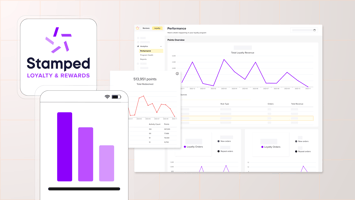Comparing Loyalty Program Platforms: Who Does It Best? (2023)
Customers today have more brands to choose from than ever, meaning they’re always searching for the next best thing. Whether they’re looking for the perfect mattress, swimsuit, or cup of coffee, brands have to work hard to stand out from the crowd and win their business. But it’s not just about getting their attention - it’s also about keeping it.
If brands want to acquire new customers and engage existing ones, they need a dedicated customer retention strategy. Acquisition costs have risen by 50% in the past five years while the average brand loses as much as 30% of its customers per year due to a lack of loyalty and an overabundance of choice. On the other hand, brands that increase their retention rate by as little as 5% can gain as much as a 95% increase in revenue.
One of the most effective ways to boost sales and retention is to run a loyalty program. 69% of customers choose brands based on whether they have a loyalty program, while 83% say that joining a loyalty program motivates them to make bigger and more frequent purchases. Furthermore, brands have a 60 to 70% chance of selling their products to an existing customer but only a 5 to 20% chance of selling to a new customer.
⚙️ To learn more about how loyalty programs can significantly impact your bottom line, check out our Loyalty ROI Calculator.
Brands shouldn’t just expect customers to remain loyal, especially with the number of competitors available in today’s market. They need to create an effective loyalty program to significantly boost customer lifetime value and average order value over time.
Whether you’re looking to launch a new loyalty program or improve your existing one, there are several platforms available to choose from. Each option has its own advantages and disadvantages - which one works best for your brand?
Discover tips and tricks for how to drive customer loyalty in every stage of the funnel and best practices for avoiding loyalty program pitfalls.
Comparing loyalty program solutions
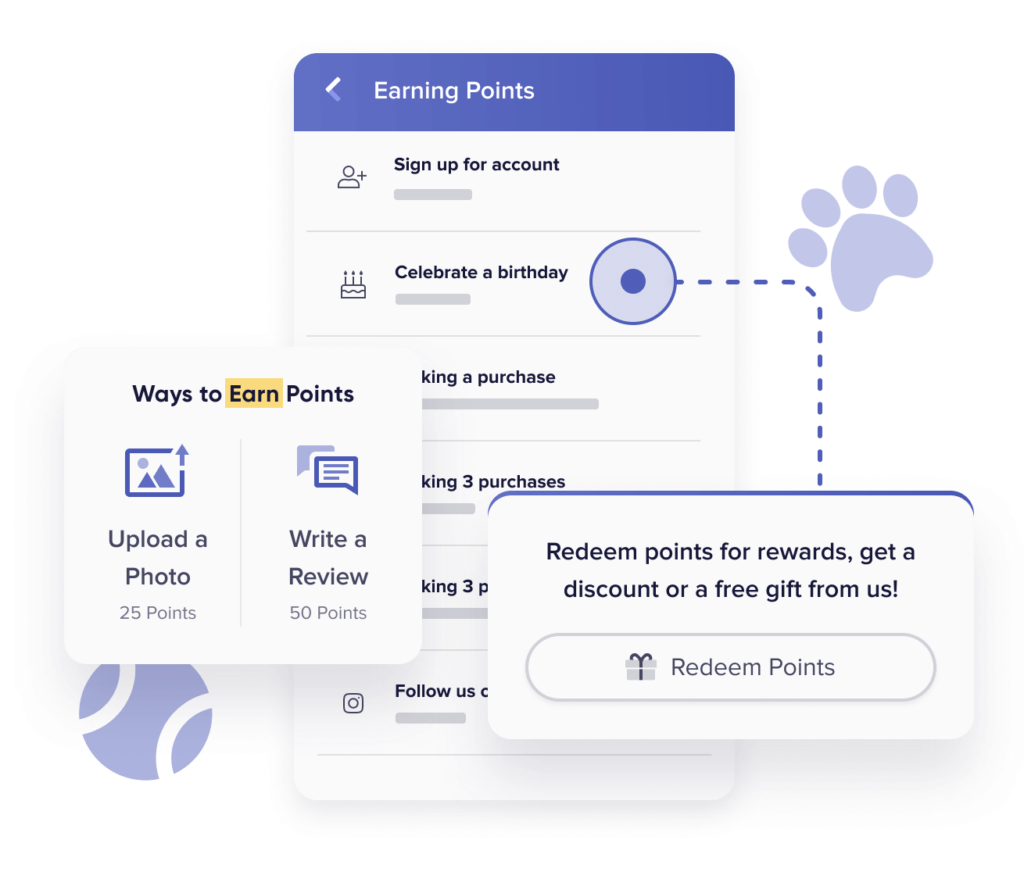
Stamped
Stamped, founded in 2016, offers solutions for loyalty and rewards, referrals, reviews and ratings, net promoter scores (NPS), user-generated content, and data-driven insights. Stamped’s mission is to “help ecommerce brands of all sizes grow their businesses through genuine relationships with their customers.” Stamped currently serves over 75,000 ecommerce brands, including Every Man Jack, Baltic Born, and Lilac St.
Customer Profile
While Stamped helps brands of all sizes accelerate their business growth, it’s best suited for mid-market and enterprise brands based on the available features and pricing plans. This includes the Full Suite option for brands looking to combine loyalty and reviews, and the Enterprise pricing plan with custom rates and a dedicated customer success manager. Stamped also has over one hundred agency partners available to help mid-market brands who don’t have a dedicated developer. Most of Stamped’s customers are in the health, wellness, beauty, apparel, and fitness industries, though we also work with home and garden, food, and sports brands as well.
Features
Overview
Stamped offers two products: Loyalty and Reviews. Loyalty maximizes engagement and customer lifetime value, while Reviews gain insights and drive increased conversions, both on-site and through other marketing channels like email, search, and social media. Both products can be leveraged together to help merchants “establish brand credibility and accelerate business growth”.
With Stamped Loyalty, brands can create fully customizable loyalty programs that reflect their brand’s look and feel. They can reward customers with points when they make a purchase, write a review, celebrate a milestone, refer a friend, and more. Rewards include percentage discounts, fixed-amount discounts, and free shipping. Brands can also create custom events and rewards, such as limited-time offers, exclusive event invitations, and early access to sales.
Brands can also implement VIP tiers and referral systems into their loyalty programs, further driving engagement, repeat purchases, and new business. They can encourage customers to spend a certain amount, earn a certain amount of points, and spread the word about their brand via email, SMS, and social media. From there, they can reward them with exclusive incentives like bigger discounts, accelerated points earnings, and so on.
Platforms & Integrations
Stamped works with Shopify and Shopify Plus, BigCommerce, and WooCommerce. It can also be implemented on a headless platform or a custom/generic ecommerce platform like Wix and Shoplazza with Stamped’s REST API. Lastly, brands can easily import their existing loyalty data into Stamped with a CSV file to ensure program continuity for their customers.
Stamped offers multiple integrations with tools that brands already know and love for marketing automations, syndication, email and SMS marketing, social commerce, payment management, and more. This includes Google, Facebook and Instagram, Attentive, Gorgias, Klaviyo, Rebuy, Tapcart, and KnoCommerce.
⚙️ Check out the full list of integrations in our Stamped Integrations Directory.
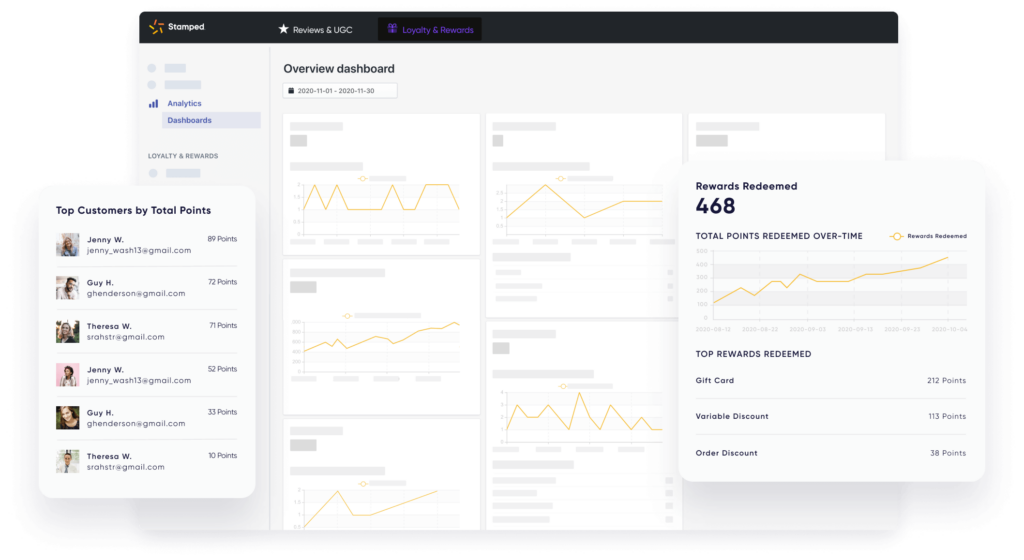
Data & Analytics
Brands also get access to powerful customer insights in the Loyalty analytics dashboard. They can identify top customers and advocates, total points and referrals, the most popular rewards, and more. These data points help brands learn more about their customers and inform their strategies for optimizing sales, engagement, retention, and lifetime value. Stamped customers on a full-suite plan can also view their rewards and reviews data in one place.
Learn more about the value of customer insights and best practices for collecting them.
Pricing Plans
Stamped currently offers five different pricing plans:
- Starter: $0/month, includes referral program and points starter program, multiple reward types, and theme branding
- Premium: $59/month billed monthly or $49/month billed annually, includes starter features + advanced reward options, custom referral codes, analytics and insights, and helpdesk and POS integrations
- Business: $179/month billed monthly or $149/month billed annually, includes premium features + HTML and CSS editor, ESP integrations, and additional integrations
- Professional: $479/month billed monthly or $399/month billed annually, includes business features + VIP tiers
- Enterprise: custom rate, includes professional features + API access, a dedicated Onboarding & Customer Success Manager, and ongoing customization support
Stamped customers get up to a 20% discount on any plan paid annually. They also have a full-suite option that combines Loyalty and Reviews so they can manage their loyalty and reviews strategies in one place. Full-suite pricing plans start at $279/month billed monthly or $229/month billed annually.
Pros and Cons
Stamped’s Loyalty solution offers features similar to other platforms like Yotpo, LoyaltyLion, and Smile. However, Stamped provides more value for brands looking to drive sales and boost customer lifetime value in a few key ways.
To start, Stamped’s fair and transparent pricing structure makes it easy for brands to get a clear sense of which plan best suits their budget and needs. Compared to other competitors, brands don’t need to pay for the most expensive plan to get access to all reward types or connect multiple integrations. Brands can also subscribe to Stamped on a month-to-month basis without needing to commit to a long-term contract.
Stamped has world-class onboarding and support teams to help brands create, manage, and optimize their loyalty program, as well as ongoing communication for product fixes, updates, and so on. It also offers a contract buyout option, making it easy for brands to switch platforms without paying excessive fees or significantly impacting their customers.
Feature-wise, Stamped customers can easily customize several aspects of their loyalty program without needing a dedicated developer. There are also multiple display widgets available to help brands highlight their loyalty and referral programs in different areas of their website. Stamped can syndicate customer profiles and program points between different stores, making it easier for businesses to manage all their brands in one place.
Lastly, Stamped Loyalty customers can take full advantage of the Full Suite option to leverage Reviews as well. Together, both products drive more sales, engagement, retention, and new business. For example, brands can ask customers to write a review in exchange for reward points, resulting in increased trust from potential customers and increased loyalty from existing ones. Reviews also boost visibility and credibility, and provide brands with the feedback they need to better serve their customers.
Learn more about Reviews to get the most out of your Stamped experience.
The main disadvantage of Stamped is that it only offers Loyalty and Reviews, which might not appeal to brands looking for platforms with other products like subscription services and SMS marketing. However, Stamped’s integration and agency partners guarantee that brands get all the features and assistance they’re looking for without needing to lock themselves into a single ecosystem. Brands don’t need to compromise to provide a well-rounded experience for their customers or struggle to connect their new loyalty program to their existing tech stack. Stamped is focused on delivering the best possible Loyalty and Reviews experience, from customer onboarding to product features to ongoing support. Stamped’s team of knowledgeable, customer-driven experts ensures that brands deliver a quality loyalty program and achieve their business goals.
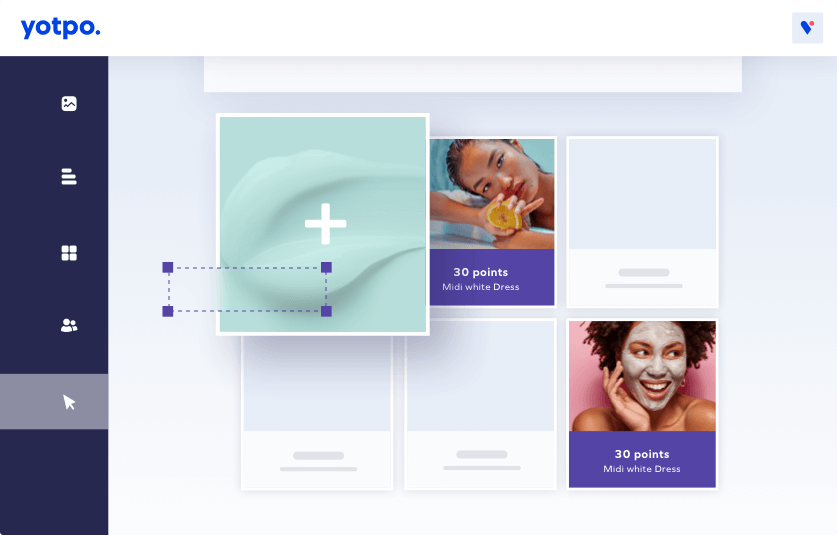
Yotpo
Yotpo was founded in 2011 by Tomer Tagrin and Omri Cohen. It offers solutions for SMS marketing, loyalty and referrals, subscriptions, reviews, and visual user-generated content. Yotpo’s mission is to “provide brands with everything they need to create winning customer experiences, from discovery to purchase.” Yotpo currently serves over 30,000 ecommerce brands, including GoPro, Steve Madden, and Muji.
Customer Profile
Yotpo is best suited for enterprise-level brands that aren’t price-conscious, as its one-to-one customer support and advanced customization features are only available for those on their Enterprise plan. Yotpo customers also need to be able to afford their own developers and build their own strategies due to Yotpo’s support limitations. Most of Yotpo’s customers are in the apparel, beauty, and wellness market, though they also work with brands in the home and garden, fitness, and food industries as well.
Features
Overview
Yotpo offers five different products: Loyalty & Referrals, SMSBump, Subscriptions, Reviews, and Visual UGC. They’re designed to work together so brands can “create customer advocates, engage at the right time, and motivate loyal customers.”
With Yotpo’s Loyalty & Referrals, brands can create a customized loyalty program with points systems, VIP tiers, diverse reward offerings, advanced segmentation, and campaign scheduling. They can also ask customers to refer their friends in exchange for exclusive rewards.
Note: VIP tiers, custom events, and custom rewards are limited to Platinum and Enterprise accounts only. Webhooks and advanced CSS are also only available for Platinum and Enterprise customers.
Platforms & Integrations
Yotpo works with Shopify and Shopify Plus, Salesforce Commerce Cloud, Magento, BigCommerce, and WooCommerce. It can also be implemented on a headless platform or a custom/generic ecommerce platform using Yotpo’s Core API.
Yotpo offers multiple integrations with tools for marketing automations, email marketing, influencer marketing, subscription management, and CRM management. This includes HubSpot, Mailchimp, Klaviyo, Gorgias, Omnisend, and Emarsys.
Note: Many integrations, such as HubSpot, Mailchimp, and Gorgias, are limited to Platinum and Enterprise accounts only.
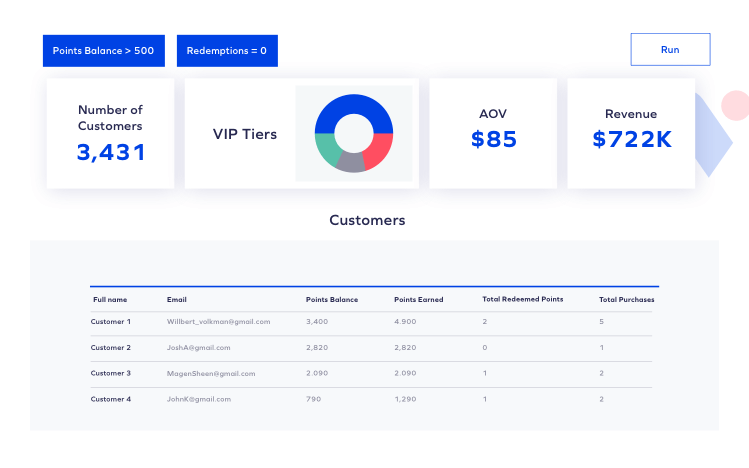
Data & Analytics
Brands also get access to intuitive reporting, user insights, and customer management. This helps them learn more about their customers and create personalized campaigns based on their actions and behaviors.
Note: If brands want to connect their Loyalty & Referrals data with data from other Yotpo products, they likely need to upgrade to a more expensive plan. For example, SMSBump’s Custom Analytics & Reports feature is limited to Enterprise accounts only at a custom rate.
Pricing Plans
Yotpo currently offers four different pricing plans:
- Free: $0/month, includes Rewards Sticky Bar, Points for Purchases, and Referral Program
- Gold: Starts at $199/month, includes free features + Dedicated Rewards Page, advanced rewards options, Reward Redemption at Checkout, and onboarding support
- Platinum: custom rate, includes gold features + VIP tiers, Targeted Campaign Segmentation, Advanced Dashboards and Reports, and Customer Onboarding and Success Management
- Enterprise: custom rate, includes platinum features + Advanced Customization Features, Dedicated Security & Compliance, Custom Reporting, and an Enterprise Customer Success Manager
Most pricing options require a custom quote and are directly tied to features, usage, and contract negotiation. Pricing plans are also limited to annual contracts only regardless of whether brands pay on a monthly or annual basis, which are set to auto-renew, and annual prices increase with each renewal. Yotpo customers can bundle Loyalty & Referrals with other products like Reviews and SMSBump at a custom rate.
Pros and Cons
The main benefit of Yotpo’s Loyalty & Referrals is the ability to bundle it with Yotpo’s other products, making it easier for brands to manage customer journeys in one place. However, this can also be a challenge for brands looking to add Yotpo to their existing tech stack, as Yotpo’s solutions are designed to work together in a single ecosystem. Yotpo’s other products can also translate to a lack of flexibility, where brands might not find the functionality they’re looking for. Specifically, Yotpo does not offer some of the most popular integrations because they directly compete with the products they offer. For example, Yotpo doesn’t have an Attentive integration as it conflicts with SMSBump, making it difficult for brands already using Attentive.
As mentioned previously, Yotpo also lacks transparency and flexibility in terms of pricing. To start, Yotpo is generally considered the most expensive option of all loyalty platform providers. Most plans require a demo before receiving a custom quote and all plans require an annual agreement, making it difficult for brands to commit or switch platforms if needed. Smaller brands may also struggle to get the support needed to run a successful loyalty program, as Yotpo’s dedicated one-to-one customer support is only available for Enterprise accounts. This can be especially challenging in the implementation stage, as some Yotpo features require extensive developer support for integration.
Lastly, Yotpo customers on a cheaper pricing plan do not have the option to remove Yotpo’s branding from their program or the ability to create custom URLs. This can be frustrating for brands and distracting to their customers.
By comparison, Stamped allows brands to easily integrate with the tools they already use and offers transparent pricing with either a monthly subscription or annual contract, preventing brands from feeling locked in. It also has dedicated onboarding and support teams to ensure business growth and success. Lastly, Stamped gives brands the option to remove Stamped branding and create custom URLs on any paid plan.

LoyaltyLion
LoyaltyLion was founded in 2012 by Charlie Casey and Dave Clark. Its primary focus is on delivering a data-driven loyalty and engagement platform. LoyaltyLion’s mission is to “help fast-growth businesses succeed in the age of Amazon by building long-lasting customer relationships.” LoyaltyLion currently serves over 10,000 ecommerce brands, including Vitabiotics, Astrid and Miyu, and REN Skincare.
Customer Profile
LoyaltyLion is best suited for mid-market brands who are solely looking for a loyalty solution and aren’t as interested in utilizing integrations, as it doesn’t offer a native reviews application and limits some of its integrations to the most expensive pricing plans. LoyaltyLion is also only available for Shopify and Shopify Plus, so it isn’t suitable for brands who run their stores on other ecommerce platforms like BigCommerce.
Features
Overview
LoyaltyLion’s loyalty platform has seven key features: points and rewards, premium features, referrals, integrations, customization, customer communications, and program analytics. The platform is intended to help brands “drive more revenue from [their] existing customers, increasing their lifetime value and driving more cost-effective acquisition through advocacy.”
With LoyaltyLion’s loyalty solution, brands can create a customized loyalty program with points and rewards, program tiers, onsite notifications, automated email campaigns, and referral systems. They can also create custom rules and points-earning activities that fit their brand’s goals.
Note: Some advanced features and custom rules and rewards options are limited to Classic accounts and up. VIP tiers are only available for Advanced and Plus customers.
Platforms & Integrations
LoyaltyLion works with Shopify and Shopify Plus. It can also be implemented on custom ecommerce platforms. It offers multiple integrations with tools for marketing automations, email marketing, subscription and review management, and help desks. This includes Attentive, Gorgias, HubSpot, Klaviyo, Mailchimp, and Tapcart.
Note: Integration categories are locked to specific pricing plans. For example, review app integrations are limited to Small Business accounts and up, subscription app integrations are limited to Advanced accounts and up, and Attentive is available for Plus customers only. For Klaviyo, Classic and Advanced customers get access to a basic version while Plus customers get access to the full version, making it a price-locked integration with limited functionality. This makes it difficult for brands using Klaviyo to downgrade their plan if needed.
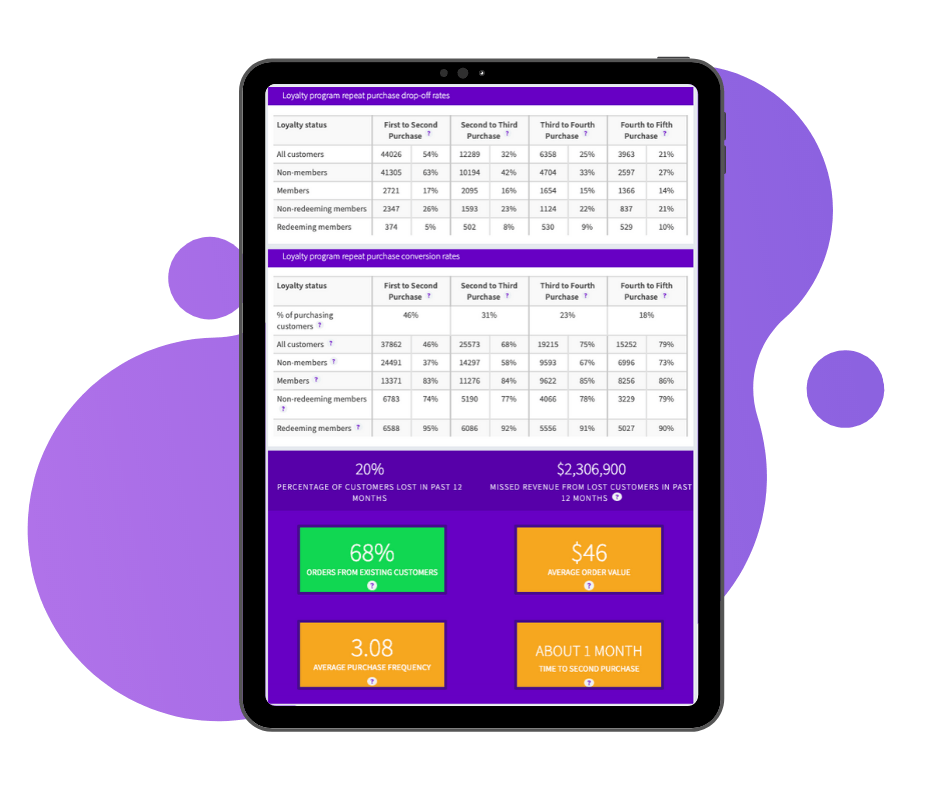
Data & Analytics
LoyaltyLion’s Customer Value Snapshot helps brands gain a better understanding of their customers’ purchase intent and buying behaviors. They can look at spend, average order value, and repeat purchase rates, compare conversion rates for each of their customer segments, and A/B test their communications to optimize their marketing efforts.
Note: Some customer insights, such as repeat purchase behavior, are limited to Plus customers only.
Pricing Plans
LoyaltyLion currently offers five different pricing plans:
- Free: $0/month, up to 800 monthly orders; includes points program, notifications, and customization options
- Small Business: $159/month, includes free features + advanced rewards options, referrals, and review app integrations
- Classic: starts at $399/month billed monthly or $359/month billed annually, starts at 2,000 monthly orders; includes small business features + points for custom onsite activities and points expiration
- Advanced: starts at $729/month billed monthly or $659/month billed annually, starts at 4,000 monthly orders; includes classic features + VIP tiers, standalone widgets, buy-with-points options, and subscription app integrations
- Plus: starts at $1,650/month billed monthly or $1,485/month billed annually, starts at 10,000 monthly orders; includes advanced features + in-cart and cross-store rewards, instant points, and Klaviyo and Attentive integrations
Pros and Cons
LoyaltyLion offers similar functions compared to other loyalty program platforms, including points and rewards, program tiers, and referral systems. It also has a few other useful features, including pre- and post-purchase notifications and segmentation for loyal, at-risk, and churned customers.
However, LoyaltyLion is also lacking in a few key areas. To start, it doesn’t have a native reviews application, and combining LoyaltyLion with another reviews platform is likely to result in significantly higher costs than solutions like Stamped’s Full Suite. It also has order limits for loyalty, meaning brands can only reward their customers up to a certain extent. Specific reward types and custom rules are limited to more expensive pricing plans, making it harder for smaller brands to build the exact loyalty program they want. LoyaltyLion’s support is primarily limited to UK time zones, which can be especially inconvenient for brands in North America.
LoyaltyLion also features less program customization compared to other platforms and can only be customized with CSS, meaning brands need a developer to personalize their program and make any future updates. Program tiers and dedicated program pages are limited to Advanced and Plus customers only, which can negatively impact awareness and engagement. Lastly, as mentioned previously, some integrations are only available through more expensive pricing plans, which can be inconvenient for brands already using tools like Attentive and Klaviyo. LoyaltyLion also has significantly fewer integrations compared to most loyalty platforms, with most of their integrations being reviews and SaaS-related only.
By comparison, Stamped offers a Full Suite solution where customers can leverage loyalty and reviews together at a reasonable rate. Stamped also offers 24/7 support, helping customers around the world no matter what timezone they’re in. Stamped customers can customize several aspects of their loyalty program directly in the platform dashboard, and only need CSS for more advanced personalization. Lastly, Stamped customers only need to pay for the cheapest pricing plan to be able to leverage all reward types, and pay significantly less (Stamped’s Business plan at $179/month versus LoyaltyLion’s Plus plan at $1,650/month) to gain full access to integrations like Attentive and Klaviyo.

Smile
Smile, founded by Mike Rossi, started as Sweet Tooth Rewards in 2012, later rebranding to Smile.io in 2017. It offers solutions for customer retention through loyalty programs with VIP tiers and referral systems. Smile’s mission is to “allow any business to reward their customers and make them smile.” Smile currently serves over 100,000 ecommerce brands, including Polaroid, Mpix, and Packlane.
Customer Profile
Smile is best suited for SMBs (small and midsize businesses) and mid-market brands with teams that prefer to self-serve and work independently. It’s also good for brands who aren’t looking for in-depth customization, as Smile lacks several personalization options. Lastly, like LoyaltyLion, Smile is best for brands who only want a loyalty solution, as it does not offer a reviews application like Stamped and Yotpo.
Features
Overview
Smile’s loyalty platform offers points and rewards, VIP tiers, and referral systems. Customers are able to see their points balances for all available Smile brands with Smile Wallet. The platform aims to help brands “turn first-time customers into forever customers.”
Smile customers can create a customized loyalty program where customers earn points for creating an account, making a purchase, engaging on social media, celebrating a milestone, and so on. They can then redeem their points for free shipping, percentage and fixed-amount discounts, and free products. Brands can personalize and manage their program with Smile’s rewards panel and admin dashboard.
Note: Brands need their own developer and Smile’s API to create and implement custom events and rewards. Smile only works with gift cards for brands using Shopify Plus, and they do not offer rewards for multiple purchases or specific order values.
Platforms & Integrations
Smile works with Shopify and Shopify Plus, BigCommerce, and Wix. It also offers multiple integrations with tools for email marketing, reviews, and business intelligence. This includes Mailchimp, Klaviyo, Omnisend, HubSpot, and Gorgias.
Note: Smile does not work with generic or custom ecommerce platforms. The number of integrations is limited based on the pricing plan.

Data & Analytics
Smile’s admin dashboard gives brands access to customer data and analytics like program membership, points history, and referral analytics. They can look at redemption rates, points volume, referral traffic and purchases, and membership history to learn more about their customers’ activity and behaviors.
Note: Advanced analytics features are limited to Growth and Plus customers only, while on-demand access to loyalty data and curated reports are limited to Plus customers only.
Pricing Plans
Smile currently offers four different pricing plans:
- Free: $0/month, up to 200 monthly orders and 0 integrations; includes points and referrals programs, automated translations, and passwordless login
- Starter: $49/month, up to 500 monthly orders and up to 2 integrations; includes free features + advanced branding and customizable reward emails
- Growth: $199/month, up to 2,500 monthly orders ($20 per additional 100 orders) and unlimited integrations; includes starter features + on-site notifications, points and rewards expiration, and advanced analytics
- Plus: $999/month, up to 7,500 monthly orders ($5 per additional 100 orders) and unlimited integrations; includes growth features + VIP tiers and API access
Smile also offers a 15% discount on any plan paid quarterly and a 20% discount on any plan paid annually.
Pros and Cons
The main benefit of Smile’s loyalty platform is its in-depth resource center and help site, simplifying the onboarding and support process for brands managing their own program. Smile also sends notifications and allows points redemption without needing customers to log in, reducing potential friction. However, Smile is also lacking compared to other platforms in terms of support, customization, and features.
To start, Smile does not offer one-to-one onboarding calls, making it difficult for brands with little to no experience in managing a loyalty program. Smile only offers live chat, along with priority support for Plus customers only. Brands also need their own developer and Smile’s API to implement custom events and rewards, with their API only being available for Plus customers. Lastly, brands are limited by the number of monthly orders and integrations they can have based on which plan they choose. Smile also offers significantly fewer integrations compared to most loyalty platforms, with most of their integrations being reviews and SaaS-related only.
Smile also lacks the amount of program customization that other platforms offer. To start, Smile does not offer interactive display widgets or dedicated program pages. This means brands and their customers are limited to a single pop-up launcher for managing points, tiers, and referrals. The lack of accessibility and functionality may make it harder for brands to share and advertise their program.
Features like program activities and redemption expiry are limited to Smile’s fixed system parameters. Points earning rules are limited to either fixed or variable amounts, meaning brands can’t create rules for multiple purchases or specific order values. On the redemption side, Smile doesn’t have the ability to handle variable point redemptions and only allows brands to round redemptions in increments of 100 points, limiting point flexibility.
Smile only has six supported languages (English, French, Portuguese, Spanish, German, and Simplified Chinese), and does not work with translation apps like Weglot or Langify. Brands can’t change the Smile UI’s font or create different types of widgets for different areas of their website. They also can’t add custom HTML to their emails, and can only use images and liquid variables to personalize their campaigns. Smile also doesn’t send notification emails to new customers for points earned when they create an account.
Lastly, as mentioned previously, Smile only works with gift cards for brands using Shopify Plus, and it doesn’t allow rewards for multiple purchases. Smile’s POS integration also has its limitations when differentiating between online and in-store purchases. Brands need to manually assign which customers can earn points online, in-store, or both. They can’t set different redemptions for online and in-store purchases, i.e. they need to be the same for both types of sales. Finally, brands need to manually return program points to customers if they don’t redeem their rewards, creating additional work for their customer support team.
By comparison, while Stamped appears to cost more than Smile at first glance, key program features like points redemption at checkout are actually cheaper (Stamped’s Premium plan at $59/month versus Smile’s Plus plan at $999/month). Like LoyaltyLion, Stamped’s full-suite option offers significant savings compared to bundling Smile with another reviews platform. As a result, Stamped offers a more robust loyalty platform to support business growth for brands of all sizes.
Stamped customers also get access to more integrations while paying less, and have more customization options to create seamless customer experiences that fit their brand’s look and goals. This includes display widgets and dedicated program pages, rewards for multiple purchases and specific order values, and custom events, rewards, and earning/redemption rules.
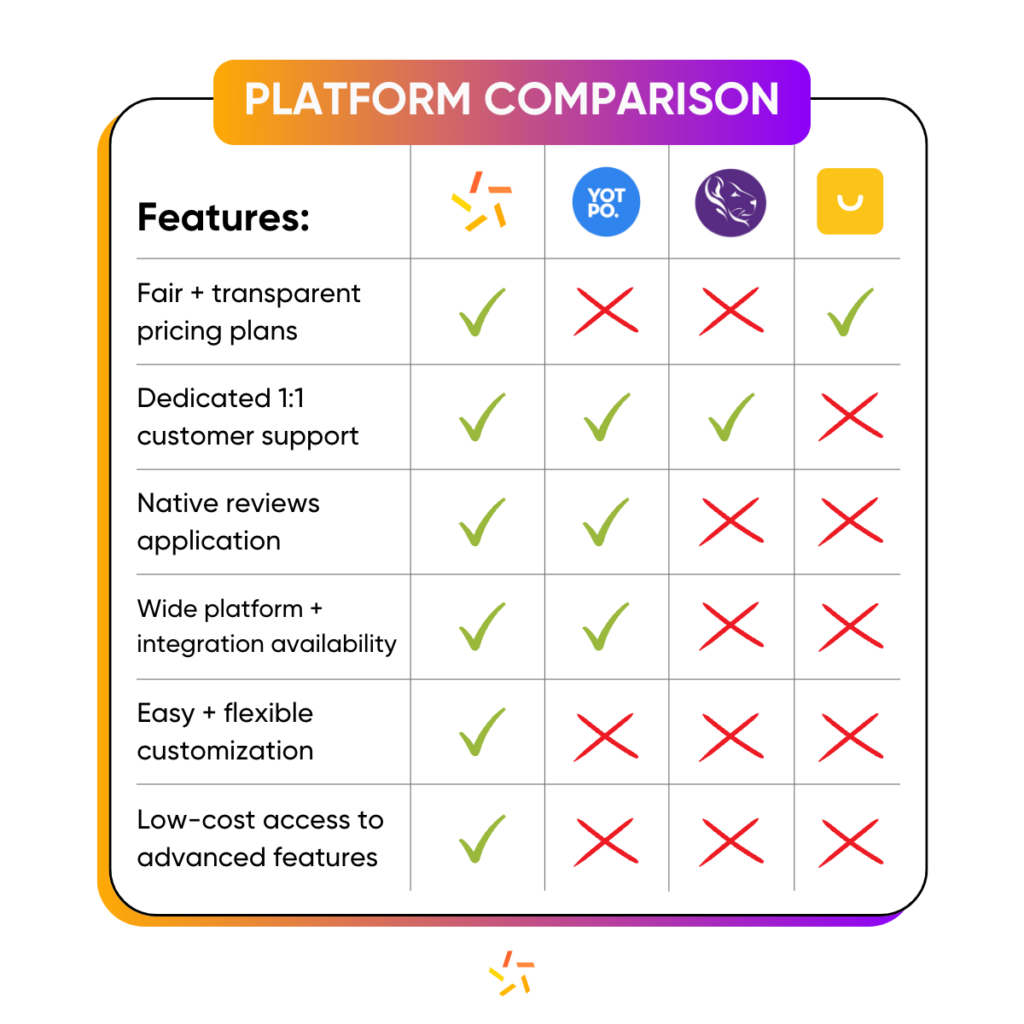
Boost lifetime value through your loyalty program with Stamped
Loyalty programs should be an essential part of every brand’s customer retention strategy. They’re proven to drive sales, engagement, and repeat purchases, helping brands build long-term relationships with their customers. When done right, loyalty programs significantly impact a brand’s ROI and customer lifetime value.
With Stamped, brands can create and run an effective loyalty program with fully customizable features, seamless integrations, a world-class support team, and actionable insights for accelerating business growth. Book a demo with one of our sales reps to learn more.


-1.jpg?width=50&name=Aiden_Brady.tif-664x900%20(1)-1.jpg)
